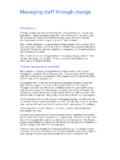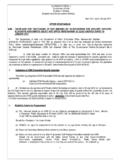Transcription of GDPR for Employers - A&L Goodbody
1 DUBLIN / BELFAST / LONDON / NEW YORK / SAN FRANCISCO / PALO ALTOGDPR for Employers Things you need to know about consent and the processing of employees dataThe EU General Data Protection Regulation ( gdpr ) introduces substantial changes to data protection law which will impact the employer/employee relationship once it comes into force on the 25 May 2018. One area that will be impacted is reliance by the employer on the employee s consent to process their data. It is common practice for employment contracts to include a blanket consent provision under the heading data protection . Typically this will provide that the employee consents to the use and processing of their data under the contract ( transfer of data overseas, monitoring, disclosure of sensitive personal data to third parties and the sharing of information with a wide variety of partners for payroll, insurance and health related purposes).
2 It is unlikely that this form of consent will be held to be effective once the gdpr comes into operation and even if it is, employees have a right to withdraw their consent at any time. Reliance on consent post 25 May 2018 If you as an employer want to rely on consent as the basis on which to process an employees data, the employees consent should be separate from the contract or, if contained within the employment contract, it should be clearly distinguishable from other aspects of the document and a separate signature box is required. Employees will have a stronger right to have their data deleted where consent is relied on as a legal basis for processing. Prior to giving consent, employees must be told of their right to withdraw consent at any time and it must be easy for them to do so ( allowing consent to be withdrawn in the same medium in which it was obtained, such as via a website or email).
3 For these reasons an employer should look for an alternative legal basis for processing in the first instance so that if consent is withdrawn the employer is not prohibited from processing personal to consent can be considered in the following circumstances 1. Where the processing is necessary for the performance of the contract with the employer or to enter into such a Where the processing is necessary for compliance with a legal obligation to which the employer is Where the processing is necessary to protect the vital interests of the employee or another person. 4. Where the processing is necessary for the performance of a task carried out in the public interest or in the exercise of official authority vested in the Where the processing is necessary for the purposes of the legitimate interests of the employer or a third party except where such interests are overridden by the interests of the practical flexibility has been built in to the gdpr itself.
4 For example, the gdpr acknowledges that the transmission of personal data within a group of undertakings for internal administrative purposes, including the processing of employee data constitutes a legitimate interest (point 5 above). Consent1 Sensitive Data and the need for explicit consentWhere consent is relied on as a ground for processing sensitive data the gdpr requires such consent to be explicit. That is not new. In practice this must mean that consent is clear, specific and unambiguous. Employee data is sensitive much of the time racial or ethnic origin, religious beliefs, trade union membership, data relating to health including mental health and sexual orientation. Again an employer should look for an alternative legal basis for processing in the first instance so that if explicit consent is withdrawn the employer is not prohibited from processing sensitive to consent can be considered in the following circumstances Where the processing is necessary for carrying out the legal rights and obligation of the employer and employee as authorised by employment/social protection law or contained in a collective agreement.
5 Where the processing is necessary to protect the vital interests of the employee or another person where the employee is physically or legally incapable of giving consent. Where the processing is necessary for a not-for-profit organisation with a political, religious, philosophical or trade union aim, and the processing is solely for their members. Where the processing is related to data which has manifestly already been made public by the employee. Where the processing is necessary for the establishment or defence of a legal claim. Where the processing is necessary for substantial public interest reasons. Where the processing is necessary for the assessment of the working capacity of the employee. Where the processing is necessary for public health reasons. Where the processing is necessary for archiving purposes in the public interest, scientific, historical research or statistical happens if businesses don t comply?
6 Breaches of the new rules could result in an increase in employment disputes and Employers could face maximum fines for data protection breaches of up to 20 million or 4% of global turnover. The gdpr widens the scope of mandatory information that must be provided to employees to ensure that the processing of their data is fair and transparent. From 25 May 2018, Employers will be required to provide employee and other data subjects, by way of a privacy notice, with the following information: The identity and contact details of the employer or its representative; The contact details of the data protection officer, where applicable; The purpose of the processing and the legal basis for the processing; The legitimate interests of the employer or a third party and an explanation of those interests (where processing is based on this ground); The recipients or categories of recipients of the personal data.
7 Details of any transfers out of the EEA, safeguards in place and the means by which to obtain a copy of required for fair and transparent processingIn addition to the above the employer is required, for the purposes of ensuring that the processing is fair and transparent, to provide the following information: The data retention period or criteria used to determine same; The employee s rights, including the right of access to data; rectification and erasure; restriction of the processing; objection to processing and to data portability; Where the processing is based on consent, the right to withdraw it at any time; The right to complain to the supervisory authority; Details of automated decision making, including profiling and logic involved, as well as the significance and consequences of such processing for the employee, and Whether the provision of personal data is a statutory or contractual requirement or obligation, and the consequences of failure to provide such you need to know about privacy noticesPrivacy NoticesData that the employer obtains directly from the employeeWhere the employer obtains the employees personal data directly from them, the privacy notice must be supplied at the time the personal data is that the employer obtains indirectly from the employeeWhere the employer does not obtain the data directly from the data subject, it must, within one month of obtaining the data, provide the employee with a similar privacy notice to that referred to above, and in addition, the categories of data processed.
8 From which source the data originated; and, if applicable, whether it came from publicly accessible sources. What happens if businesses don t complyBreaches of the new rules could result in an increase in employment disputes and Employers could face maximum fines for data protection breaches of up to 20 million or 4% of global processingWhere the employer intends to further process the data other than for the purpose for which it was collected, the employer must inform the data subject, prior to the further processing, of that other is the deadline for compliance? Employers have until the 25 May 2018 to make sure their processing practices meet with new you need to know about Data Subject Access Requests (DSARs)From 25 May 2018 the time period for an employer to respond to a DSAR will be reduced from 40 days to one calendar month. This can be extended by a further two months where requests are complex or numerous.
9 However, the employee must be informed of any proposed extension within one month of the employer s receipt of the DSAR. In practice, we anticipate many Employers will seek to portray requests as complex and/or numerous to avail of the three month fee has been abolished The ability to charge a fee has been removed. However an employer may charge a reasonable fee for any further copies requested or where access requests are clearly unfounded or information is the employer obliged to provide?When providing employees with their data Employers must provide the following information: The purpose of processing the data The categories of personal data The recipients or categories of recipients The data retention period or criteria used to determine the criteria The individual s rights including their right to correction, erasure; restriction or objection to the processing The right to complain to the Office of the Data Protection Commissioner The source of the information, if not collected directly from the data subject Details of any automated processes including profiling and the significance and envisaged consequences of the processing for the data subject Where data is transferred out of the EEA, the appropriate safeguards that are in happens if businesses don t comply?
10 Breaches of the new rules could result in an increase in employment disputes. Employers could face maximum fines for data protection breaches of up to 20 million or 4% of global turnover. 3 Data Subject Access Requests (DSARs)4 Security ObligationsEnhanced security measures The EU General Data Protection Regulation ( gdpr ) increases employer obligations to protect the security and integrity of personal data. Data must be protected by appropriate technical and organisational measures .In particular the employer should consider the risks presented by accidental or unlawful destruction, loss, alteration, unauthorised disclosure of, or access to personal data transmitted, stored or otherwise processed. Appropriate technical and organisational measures are described as including: Pseudonymisation (replacing any identifiable characteristics of personal data with a pseudonym so that the data subject cannot be directly identified) and the encryption of data.










